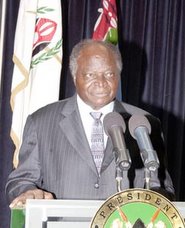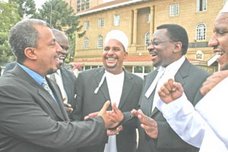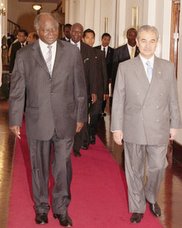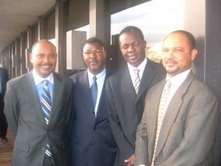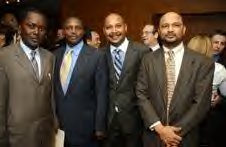SUNDAY TIMES
Commentary & Analysis
March 23, 2008
Story by: OMAR ALI
Much has been commented pertaining to the selections and appointments of the two Deputy Prime Ministers’ positions that were created by the latest constitutional amendment.
Before William Ruto courageously endorsed his party’s presidential running mate, Musalia Mudavadi, to one of the two posts, every tribe was pushing for one of their own to be named to the two coveted spots from amongst their respective political parties.
Now that the matter within Orange Democratic Movement has been settled, there is a compelling need to look at how political power distribution stands in the country. Kenya is about to embark on a journey of national reconciliation and in order to genuinely investigate the recent mayhem, every region ought to be recognized and appreciated in a form of balancing the national leadership positions.
Power-sharing as has been agreed by the Kofi Annan-led mediation talks that will lead to installing and or making Raila Odinga a prime minister and some of his close associates’ becoming cabinet ministers is only a short term solution to the country’s ailments. There is more than needs to be done and not to give power to the few and all will be well. Some regions have more than their share of national leadership positions while others have never had the opportunity to be given any of these positions. For instance, if we are to count the office of the Chief Justice as one of the national leadership positions, the country has a total of eight of those positions, namely the president, prime minister, vice president, two deputy primers, speaker and deputy speaker. As we all know, the presidency, vice presidency, and speaker and deputy speaker are filled.
So far Central province with two individuals amongst the eight enjoys the lion’s share by having the top seat in the land (the presidency) and that of the chief justice. Eastern occupies the vice presidency. The posts of the National Assembly Speaker and the Deputy Speaker are held by individuals hailing from Western and North Eastern provinces’ respectively. Raila, the Prime Minister-designate, a legislator representing a parliamentary constituency in the Nairobi, is without saying represents his native Nyanza province.
As part of the mediation and power-sharing agreement the Lang’ata lawmaker is all but assured of taking the premiership. With Raila becoming the second prime minister in the history of independent Kenya, brings us to Coast province, a region that has not had the chance to be represented at national leadership level in the history of independent Kenya. The country’s presidents, vice presidents, premier (and soon to be premiers), national assembly speakers and deputy speakers have all hailed from every other province but the Coast. This is not just a mere coincidence. Not all those positions I have named are fought competitively, all but one are given out for whatever reasons. For instance, the country has had ten vice presidents, a presidential appointment, but no Coast politician has been deemed fit to be appointed to the coveted number slot. Why is that the case? Now with Ruto having endorsed Mudavadi, ODM has settled the matter on their party’s slot.
This leaves PNU as the only party that has a chance to rise above petty regional politics and select one of their own from the seaside province for their spot. It is very disingenuous that some people are making the case for PNU to appoint Uhuru Kenyatta or Martha Karua to the position, or even Kiraitu Murungi or George Saitoti. With all due respect to these PNU politicians, the proposed individuals all come from regions that are already represented at national level or have historical been represented before as is the case with Saitoti’s Rift Valley province.
I will be accused of being biased here for making the case for a Coastal politician to be appointed to the deputy prime minister’s post. As for the biased charges, I will say, I am guilty as charged but the fact remains that PNU needs to select a politician from the Coast for their slot. The best pick for the party is Ambassador Chirau Ali Mwakwere, a consistent loyal supporter of President Mwai Kibaki. The Transport Minister is an experienced hand and the President’s staunch ally and one of the first among equals’ loyalists. In terms of education, professional experience and expertise, the former Foreign Affairs Minister is a match to any politician in the country. At grassroots level, the two term Matuga MP hails from Coast province’s most populous Mijikenda community. He was recently endorsed by the community’s Council of Elders through their Secretary General Vincent Mwachiro who noted: “Appointing Minister Mwakwere to one of the two deputy prime ministerial posts is an important move in ensuring that leadership opportunities are given to all communities in this country,”
If it makes any different, which I believe it should, the Matuga MP is also a Muslim, the religious community that has risen only to the deputy speaker’s post in the national leadership positions in the country since independence. If United States is on the verge of electing Sen Barack Obama as the nation’s first lack president, who incidentally has Kenyan roots, why can’t Kenya name the first Muslim to a deputy prime minister’s position? Internationally, Mwakwere has served as a diplomat in Zimbabwe and United Arab Emirates that gave him the crucial ‘diplomatic circles exposure’ that comes handy for this position. Such experience and or exposure are critical. Since not having such experience can usually expose a politician to much ridicule.
+++++++++++
http://www.kenyatimesonline.com/content.asp?catid=5&articleId=2209











